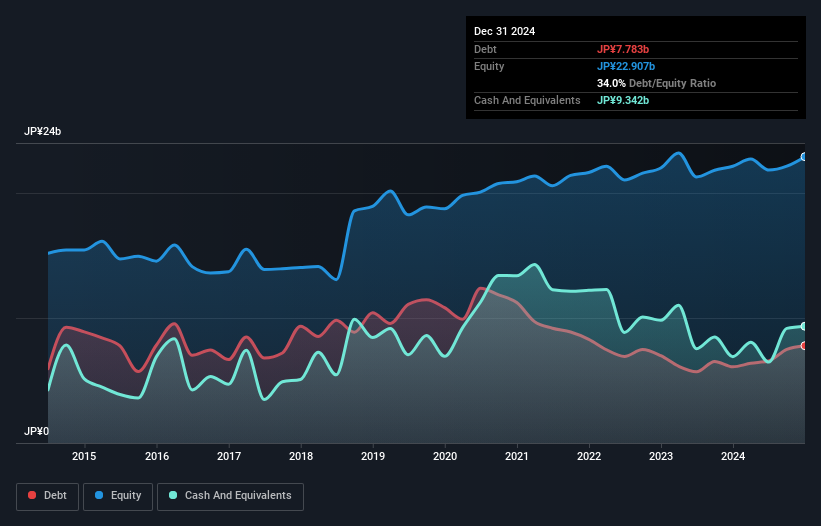
David Iben put it well when he said, 'Volatility is not a risk we care about. What we care about is avoiding the permanent loss of capital.' So it might be obvious that you need to consider debt, when you think about how risky any given stock is, because too much debt can sink a company. As with many other companies Nac Co., Ltd. (TSE:9788) makes use of debt. But the more important question is: how much risk is that debt creating?
We've discovered 1 warning sign about Nac. View them for free.When Is Debt Dangerous?
Debt and other liabilities become risky for a business when it cannot easily fulfill those obligations, either with free cash flow or by raising capital at an attractive price. Ultimately, if the company can't fulfill its legal obligations to repay debt, shareholders could walk away with nothing. While that is not too common, we often do see indebted companies permanently diluting shareholders because lenders force them to raise capital at a distressed price. By replacing dilution, though, debt can be an extremely good tool for businesses that need capital to invest in growth at high rates of return. The first step when considering a company's debt levels is to consider its cash and debt together.
How Much Debt Does Nac Carry?
You can click the graphic below for the historical numbers, but it shows that as of December 2024 Nac had JP¥7.78b of debt, an increase on JP¥6.10b, over one year. However, it does have JP¥9.34b in cash offsetting this, leading to net cash of JP¥1.56b.

A Look At Nac's Liabilities
The latest balance sheet data shows that Nac had liabilities of JP¥12.6b due within a year, and liabilities of JP¥5.26b falling due after that. Offsetting these obligations, it had cash of JP¥9.34b as well as receivables valued at JP¥5.53b due within 12 months. So its liabilities total JP¥2.97b more than the combination of its cash and short-term receivables.
Of course, Nac has a market capitalization of JP¥24.2b, so these liabilities are probably manageable. However, we do think it is worth keeping an eye on its balance sheet strength, as it may change over time. Despite its noteworthy liabilities, Nac boasts net cash, so it's fair to say it does not have a heavy debt load!
Check out our latest analysis for Nac
But the other side of the story is that Nac saw its EBIT decline by 2.8% over the last year. That sort of decline, if sustained, will obviously make debt harder to handle. The balance sheet is clearly the area to focus on when you are analysing debt. But it is Nac's earnings that will influence how the balance sheet holds up in the future. So when considering debt, it's definitely worth looking at the earnings trend. Click here for an interactive snapshot.
Finally, a business needs free cash flow to pay off debt; accounting profits just don't cut it. Nac may have net cash on the balance sheet, but it is still interesting to look at how well the business converts its earnings before interest and tax (EBIT) to free cash flow, because that will influence both its need for, and its capacity to manage debt. In the last three years, Nac's free cash flow amounted to 41% of its EBIT, less than we'd expect. That weak cash conversion makes it more difficult to handle indebtedness.
Summing Up
While Nac does have more liabilities than liquid assets, it also has net cash of JP¥1.56b. So we don't have any problem with Nac's use of debt. The balance sheet is clearly the area to focus on when you are analysing debt. However, not all investment risk resides within the balance sheet - far from it. Be aware that Nac is showing 1 warning sign in our investment analysis , you should know about...
If you're interested in investing in businesses that can grow profits without the burden of debt, then check out this free list of growing businesses that have net cash on the balance sheet.
Valuation is complex, but we're here to simplify it.
Discover if Nac might be undervalued or overvalued with our detailed analysis, featuring fair value estimates, potential risks, dividends, insider trades, and its financial condition.
Access Free AnalysisHave feedback on this article? Concerned about the content? Get in touch with us directly. Alternatively, email editorial-team (at) simplywallst.com.
This article by Simply Wall St is general in nature. We provide commentary based on historical data and analyst forecasts only using an unbiased methodology and our articles are not intended to be financial advice. It does not constitute a recommendation to buy or sell any stock, and does not take account of your objectives, or your financial situation. We aim to bring you long-term focused analysis driven by fundamental data. Note that our analysis may not factor in the latest price-sensitive company announcements or qualitative material. Simply Wall St has no position in any stocks mentioned.
About TSE:9788
Nac
Engages in the renting and sale of dust control and cleaning products, and equipment in Japan.
Flawless balance sheet average dividend payer.
Market Insights
Community Narratives



